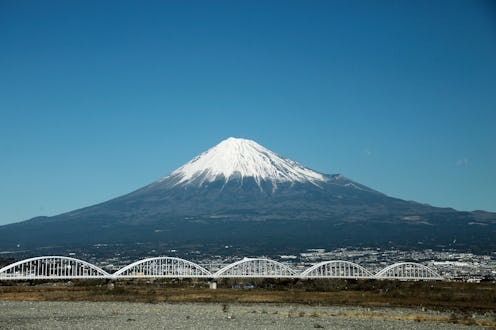News
Wait, Is Mt. Fuji About To Erupt?
As headlines go, this one's gotta be causing some stress in Japan right now— researchers have found Mt. Fuji in a "critical state," and that the long-dormant volcano could be primed for an eruption in the near future. Mt. Fuji, classified as a stratovolcano, hasn't gone off in a good long while, since well before the United States of America existed. Its last eruption was between 1707 and 1708, over 300 years ago.
Researchers determined the situation to be critical through a new, groundbreaking earthquake-related way to try to predict volcanic eruptions, and as such there's not a long-term track record for the method yet, nor an iron-clad guarantee if or when Mt. Fuji is going to blow. But here's the basic idea: they've been studying how earthquakes can act as predictors for volcanic events, zeroing in on a cataclysmic example the Japanese remember all too well — the 2011 Tohoku-oki earthquake, which triggered the tsunami that ultimately crippled the Fukushima Daiichi Nuclear Power Plant, and sent it into meltdown.
It was the largest earthquake in Japan's history, at a magnitude of 9.0, and left over 15,000 people confirmed dead. And now, a team of French researchers from the Institute of Earth Sciences and the the Paris Institute of Earth Physics (in concert with Japanese scientists), led by seismology professor Florent Brenguier, claim the quake was likely also a harbinger of an approaching volcanic event.
Here's how they did it: They measured something called "seismic noise," described in an in-depth piece at The Guardian as "the result of constant interaction between ocean swell and "solid" earth," which up until now had been "generally been dismissed as background interference." By tracking the noises, the researchers were able to chart possible disturbances to the bedrock of the Japanese mainland. As The Guardian quoted Brenguier:
Seismic waves travel a very long way, going round the world several times. Their movement makes the Earth's crust vibrate, and rather like a shock wave this produces breaks or cracks in the rock.
The team found that the point of origin for the quake, off the eastern coast of Japan, actually wasn't the most heavily-disrupted location in seismic terms. Rather, it was below Mt. Fuji, and a subsequent, smaller earthquake in the days following the 9.0 disaster only furthers the team's assessment that the pressure for another eruption is building. As Brenguier continued:
We cannot establish a direct relation of cause and effect between quakes and volcanic eruptions, even if statistically the former lead to an increase in the latter. All we can say is that Mount Fuji is now in a state of pressure, which means it displays a high potential for eruption. The risk is clearly higher.
In other words, the earthquake of 2011 may have presaged another natural disaster to come. Luckily, if there's any silver-lining to be taken from this, it's that Japan keeps a pretty close eye on Mt. Fuji's volcanic activity. In 2013, retired professor Masaki Kimura of Ryukyu University claimed that the volcano should erupt by the end of 2015, blaming the rising water level of nearby Lake Sai on Mt. Fuji's magma melting away the permafrost on its peak.
Image: Getty Images
